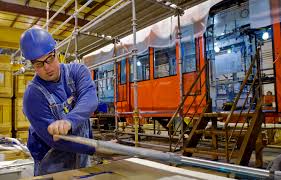If you’re like me, you’re usually excited about job creation. So, if you’re like me, you’re happy when you hear that a new manufacturing plant is being built, because you think that people are getting good jobs. It seems so simple: new factories mean good jobs, right?
Wrong.
Between 2010 and 2012, the manufacturing industry has grown by 4.3 percent (Wessel and Hagerty, 2012). But in 2007, the median wage of manufacturing workers dipped below that of the rest of the private sector. It and has continued to go down since (U.S. Census in Ruckelshaus and Leberstein, 2014).
Why are workers’ wages dropping like this? It seems to me that there are two main reasons.
The first is that corporations can often lower these workers’ wages with impunity.
In order to boost job creation, states offer major financial incentives for companies to open manufacturing facilities. According to a 2014 article, however, corporations do not have to meet any wage requirements to receive benefits. Many corporations even elect to build plants in the south, where the labor standards are lower. The Manufacturing industry does create many jobs, but it does not create good jobs.
But why do the corporations behave this way?
According to Karl Marx (1888), it is because this is what happens in a capitalist society. Marx believes that capitalist societies are always a battleground between the working class (the proletariat) and the owning class (the bourgeoisie). As Marx says, capitalism “[leaves] remaining no other nexus between man and man than naked self interest” (Marx, 1888). Marx believes that members of capitalism’s owning class (in this case, the manufacturing corporations) always act exclusively in pursuit of their own ends. According to Robert Reich (2007), American shareholders are following this pattern by inciting corporations’ “the obsessive drive to meet or exceed Wall Street’s estimates of pending quarterly earnings”. Clearly, America’s bourgeoisie is trying to maximize profit for itself.
What most of us don’t realize, though, is that it’s not just the corporations’ fault. And this leads to the second reason why wages for manufacturing workers are falling:
The American people push these corporations to expand.
Nine out of ten Americans believe that manufacturing corporations create good jobs, and many listed a manufacturing plant as one of the top facilities they would want to be brought into their community to create jobs (As cited in Ruckelshaus and Leberstein, 2014). Because of this, Americans push the government to use tax dollars to incentivise large corporations to build more manufacturing facilities. We only focus on the number of jobs that the industry can create, and do not realize that we are contributing to a system that hurts workers.
So, is it possible to reverse this trend?
If the government places more regulations on corporations, those corporations will be less likely to set up facilities in this country. If we do nothing, however, manufacturing workers’ wages may continue to drop. We are reminded of Marx’s prophecy about the end of capitalism, where the entire system crumples because the bourgeoisie has oppressed the workers to the extent that “the slave cannot exist within his slavery” (Marx 1888). If we cannot do something to fix this problem, this prophecy may come true.
There are no easy solutions to this problem, but if we do not try to solve, it this…

…may become this again.

